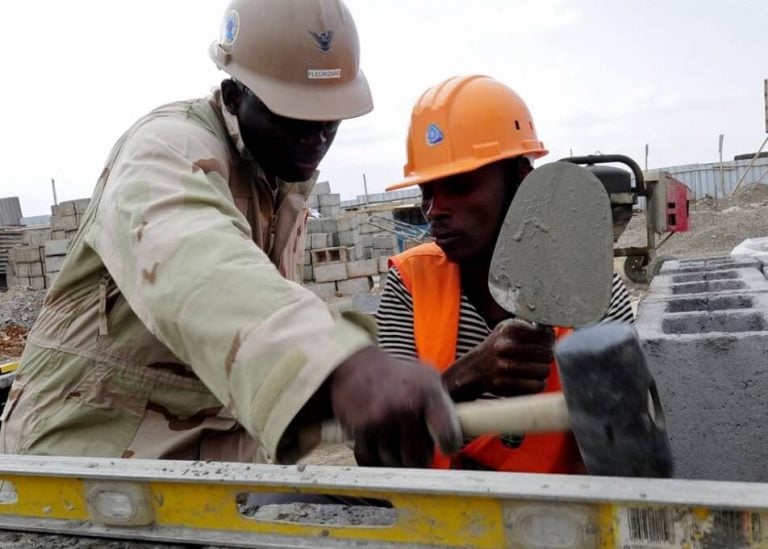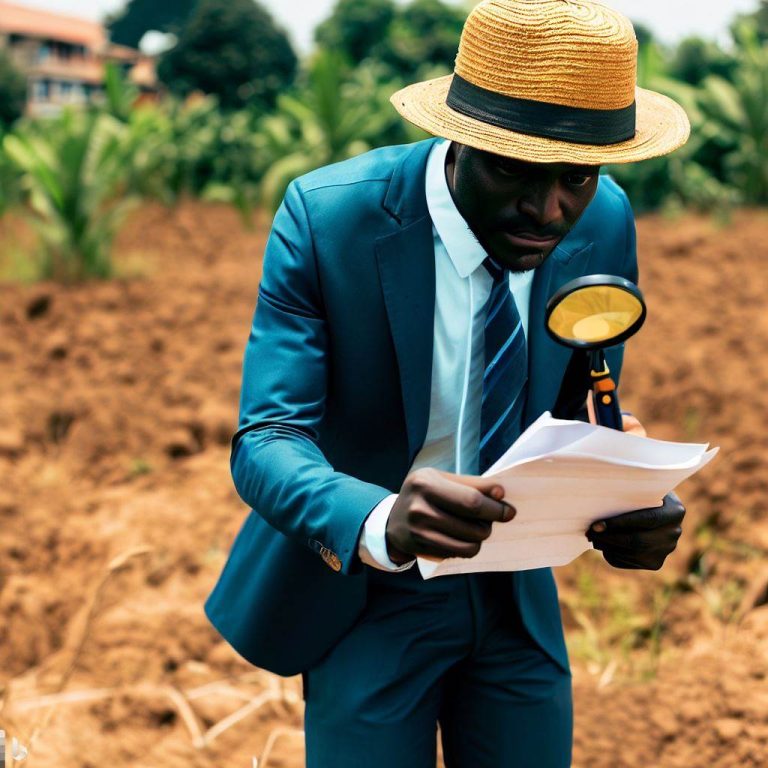Land banking in Ghana:The Business Case of Investing in Lands.
|
Getting your Trinity Audio player ready...
|
Are you considering investing in land in Ghana? Land banking can be a lucrative and secure way to grow your wealth and generate passive income, but it’s important to do your research and understand the risks and challenges involved.
There are several reasons why land banking is a good business case in Ghana.
Firstly, Ghana is experiencing rapid economic growth and urbanization, leading to an increase in demand for land. This is particularly evident in the country’s capital, Accra, where the population is expected to reach over 5 million by 2030. As the population grows, so does the demand for housing and commercial developments, which leads to an increase in land values.
Secondly, Ghana has a stable political and economic environment, making it a relatively safe place to invest. The government has also implemented policies to encourage foreign investment, such as the Land Act of 2002, which allows non-citizens to own land in the country.
Lastly, Ghana has a favorable climate and fertile soil, making it a prime location for agriculture. The country is known for producing a variety of crops such as cocoa, oil palm, and maize, and there is potential for even more expansion in the agricultural sector. This makes land a valuable asset not just for housing and commercial developments, but also for farming and other agricultural activities.
Overall, investing in land in Ghana can be a lucrative business case due to the increasing demand for land, stable political and economic environment, and potential for agricultural growth. It is important to conduct thorough research and due diligence before making any investments, however, to ensure a successful outcome.
Read Also: Building Your House In Ghana-The Quick Easy Guide

Here is a detailed blog post on land banking in Ghana:
The Business Case for Investing in Lands in Ghana: A Comprehensive Guide to Land Banking
Land banking is the practice of purchasing land for the purpose of holding onto it for a long period of time in anticipation of future appreciation in value. It is a popular investment strategy in countries where land values are expected to increase, such as in Ghana.
In this comprehensive guide, we’ll cover the basics of land banking in Ghana, including the current state of the real estate market, the benefits and risks of investing in land, and tips for finding and evaluating potential land investment opportunities.
Whether you’re a seasoned investor or new to the world of real estate, this guide will provide valuable insights and help you make informed decisions about land banking in Ghana.
Read Also: Professionals You Need to Build Your House In Ghana
Introduction to land banking as a viable investment option in Ghana
Land banking refers to the practice of buying and holding land as an investment. It can be a long-term strategy, with the goal of generating passive income through leasing or selling the land at a profit when the market is favorable. Land banking is a popular investment option in many countries, including Ghana, where the real estate market has shown steady growth in recent years.
The current state of the real estate market in Ghana
Ghana’s real estate market has experienced steady growth over the past decade, with demand for residential and commercial properties increasing in major cities like Accra, Kumasi, and Takoradi.
The country’s robust economic growth, rising middle class, and expanding infrastructure have all contributed to the growth of the real estate market.
According to the Ghana Real Estate Developers Association (GREDA), the demand for affordable housing is particularly high, with a backlog of over 1.7 million units. This presents an opportunity for land investors to meet this demand through the development of residential properties.
Read Also: Cost Breakdown for building A Residential House in Ghana
The benefits of investing in land
There are several benefits to investing in land, including:
- Potential for appreciation: Land is a tangible asset that can appreciate in value over time. In Ghana, the real estate market has shown consistent growth, with demand for land increasing in major cities and tourist areas. This can lead to capital appreciation, or an increase in the value of the land over time.
- Passive income: Land can generate passive income through leasing or renting to tenants. This can be a steady source of income, particularly if the land is located in a high-demand area.
- Diversification: Investing in land can be a way to diversify your investment portfolio, reducing your risk and potentially increasing your returns.
Read Also: Cost of Building a House in Ghana
The process of buying and owning land in Ghana
If you’re interested in investing in land in Ghana, it’s important to understand the legal process for buying and owning land. Here are some key considerations:
- Title deeds: A title deed is a legal document that serves as proof of ownership for a piece of land. In Ghana, it’s important to ensure that the seller has a valid title deed before purchasing land. It’s also important to conduct a title search to ensure that there are no outstanding claims or disputes on the land.
- Land registration: In Ghana, all land must be registered with the Lands Commission, which is responsible for managing and administering land in the country. The process for registering land includes obtaining a land certificate, which is a legal document that serves as proof of ownership.
- Leases: If you’re planning to lease your land to tenants, it’s important to have a written lease agreement in place. This should outline the terms of the lease, including the duration, rent, and any other obligations or responsibilities of the parties involved.
Read Also: How to do a land title search in Ghana
Tips for finding and evaluating potential land investment opportunities in Ghana
When looking for land investment opportunities in Ghana, it’s important to consider the following factors:
- Location: Look for land in high-demand areas, such as major cities or tourist areas. Land in these areas is likely to have a higher potential for appreciation and rental income.
- Infrastructure: Consider the availability of basic infrastructure, such as roads, electricity, and water. Land with access to these amenities is more likely to be attractive to potential tenants and buyers.
- Market demand: Look for land in areas with a strong demand for housing or commercial properties. This can increase the potential for appreciation and rental income.
Read Also: How to Sell any Uncompleted Building in Ghana Using 3D Visualization
Risks and challenges of land investment in Ghana
Like any investment, land investment carries some risks and challenges. Some of the risks to consider include:
- Title disputes: There is a risk of title disputes in Ghana, which can arise if there are conflicting claims to the land. It’s important to conduct a thorough title search and ensure that the seller has a valid title deed before purchasing land.
- Lack of infrastructure: Land in rural or underdeveloped areas may lack basic infrastructure, such as roads, electricity, and water. This can make it difficult to develop the land or attract tenants.
- Market fluctuations: The real estate market can be volatile, and land values can fluctuate based on economic conditions and other factors. It’s important to consider the potential for market fluctuations when evaluating land investment opportunities.
Ways to mitigate risks and maximize returns on land investments in Ghana
There are several steps you can take to mitigate the risks and maximize the potential returns on your land banking in investment efforts in Ghana:
- Diversification: Consider investing in a portfolio of land, rather than just one piece. This can help to spread your risk and potentially increase your returns.
- Work with trusted advisors: It’s important to work with trusted advisors, such as lawyers and real estate agents, who can help you navigate the legal and logistical aspects of land investment in Ghana.
- Conduct thorough due diligence: Before purchasing land, be sure to conduct a thorough due diligence process, including a title search and evaluation of the location, infrastructure, and market demand.
Case studies of successful land investments in Ghana
To give you a sense of the potential returns on land investments in Ghana, here are a few case studies of successful land investments:
- In 2018, an investor purchased a piece of land in the suburb of East Legon, Accra for GHC100,000. After developing the land into a residential property and leasing it out for several years, the investor sold the property for GHC300,000, realizing a profit of GHC200,000.
- In 2020, a group of investors purchased a piece of land in the tourist area of Cape Coast for GHC50,000. After obtaining the necessary approvals and building a small hotel on the land, the investors were able to generate a steady stream of rental income. When the hotel was sold a few years later, the investors realized a profit of GHC200,000.
- In 2021, a developer purchased a piece of land in the suburb of Tema for GHC150,000. After obtaining the necessary approvals and building a residential complex on the land, the developer was able to sell the units for a total of GHC500,000, realizing a profit of GHC350,000.
Conclusion and summary
Land banking can be a lucrative and secure way to grow your wealth and generate passive income in Ghana. By understanding the current state of the real estate market, the benefits and risks of investing in land, and the process of buying and owning land in Ghana, you can make informed decisions about your land investment strategy. It’s important to conduct thorough due diligence, work with trusted advisors, and consider diversification to mitigate risks and maximize returns. With careful planning and a long-term perspective, land banking can be a rewarding and successful investment option in Ghana.
FAQ: Land banking in Ghana.
Q: Is land banking a good investment in Ghana?
A: Land banking can be a good investment in Ghana, as the real estate market has shown steady growth in recent years. There is a strong demand for residential and commercial properties in major cities and tourist areas, which can lead to capital appreciation and rental income. However, like any investment, land banking carries some risks and challenges, including the potential for title disputes and market fluctuations. It’s important to conduct thorough due diligence and work with trusted advisors to mitigate these risks and maximize your returns.
Q: What are the risks of investing in land in Ghana?
A: Some of the risks of investing in land in Ghana include title disputes, lack of infrastructure, and market fluctuations. It’s important to conduct a thorough title search and ensure that the seller has a valid title deed before purchasing land. Land in rural or underdeveloped areas may lack basic infrastructure, which can make it difficult to develop or attract tenants. The real estate market can be volatile, and land values can fluctuate based on economic conditions and other factors. It’s important to consider these risks when evaluating land investment opportunities in Ghana.
Q: How do I find land investment opportunities in Ghana?
A: There are several ways to find land investment opportunities in Ghana:
- Work with a real estate agent or broker: A real estate agent or broker can help you identify land investment opportunities and guide you through the process of buying and owning land in Ghana.
- Search online listings: There are a number of online platforms and websites that list land for sale in Ghana, including local real estate agencies and international property portals.
- Attend real estate events and trade shows: Events and trade shows, such as the Ghana International Trade Fair and the West Africa Property Investment Summit, can be a good way to connect with potential sellers and learn about land investment opportunities in Ghana.
- Network with other investors: Connecting with other investors and industry professionals can be a good way to learn about land investment opportunities in Ghana. You can join local real estate investment groups, attend industry events, and join online forums to connect with other investors.
Q: How do I evaluate the potential of a land investment opportunity in Ghana?
A: There are several factors to consider when evaluating the potential of a land investment opportunity in Ghana:
- Location: Look for land in high-demand areas, such as major cities or tourist areas. Land in these areas is likely to have a higher potential for appreciation and rental income.
- Infrastructure: Consider the availability of basic infrastructure, such as roads, electricity, and water. Land with access to these amenities is more likely to be attractive to potential tenants and buyers.
- Market demand: Look for land in areas with a strong demand for housing or commercial properties. This can increase the potential for appreciation and rental income.
- Zoning and development potential: Consider the zoning laws and development potential of the land. Are there any restrictions on how the land can be used? Is the land suitable for residential, commercial, or industrial development?
- Environmental and physical features: Evaluate the environmental and physical features of the land, such as topography, soil quality, and access to natural resources. These can affect the development potential and value of the land.
It’s also important to conduct a thorough due diligence process, including a title search and evaluation of the legal and regulatory environment. Working with trusted advisors, such as lawyers and real estate agents, can help you navigate the process and make informed decisions about land investment opportunities in Ghana.
Q: How do I protect my land investment in Ghana?
A: There are several steps you can take to protect your land investment in Ghana:
- Conduct thorough due diligence: Before purchasing land, be sure to conduct a thorough due diligence process, including a title search and evaluation of the location, infrastructure, and market demand.
- Work with trusted advisors: It’s important to work with trusted advisors, such as lawyers and real estate agents, who can help you navigate the legal and logistical aspects of land investment in Ghana.
- Obtain a title deed: A title deed is a legal document that serves as proof of ownership for a piece of land. In Ghana, it’s important to ensure that the seller has a valid title deed before purchasing land.
- Register the land: In Ghana, all land must be registered with the Lands Commission. The process for registering land includes obtaining a land certificate, which is a legal document that serves as proof of ownership.
- Have a written lease agreement: If you’re planning to lease your land to tenants, it’s important to have a written lease agreement in place. This should outline the terms of the lease, including the duration, rent, and any other obligations or responsibilities of the parties involved.
By following these steps and maintaining proper documentation, you can protect your land investment and ensure that you have a secure and legally-binding ownership interest in the property.
Q: Can I invest in land in Ghana as a foreign investor?
A: Yes, foreign investors can invest in land in Ghana. However, it’s important to be aware of the legal and regulatory requirements for foreign investment in the country. According to the Ghana Investment Promotion Centre (GIPC), foreign investors are allowed to purchase and own land in Ghana, provided that they obtain the necessary approvals and licenses.
Foreign investors should also be aware of the Ghanaian Land Tenure Law, which regulates the ownership and transfer of land in the country. The law requires that all land transactions be registered with the Lands Commission and that a title deed be issued to the owner. Foreign investors should work with trusted advisors, such as lawyers and real estate agents, to ensure that they comply with all relevant laws and regulations.
Overall, investing in land in Ghana can be a lucrative and secure way to grow your wealth and generate passive income. By understanding the legal and regulatory requirements and following best practices for due diligence and risk management, foreign investors can successfully navigate the land investment process in Ghana.
Read Also: 5 Ways to Become a House Owner in Ghana
Q: Can I develop my land investment in Ghana?
A: Yes, you can develop your land investment in Ghana. However, it’s important to be aware of the legal and regulatory requirements for development in the country. According to the Ghana Investment Promotion Centre (GIPC), foreign investors are allowed to develop land in Ghana, provided that they obtain the necessary approvals and licenses.
Before developing your land, you should consider the zoning laws and development potential of the property.
Are there any restrictions on how the land can be used? Is the land suitable for residential, commercial, or industrial development? It’s also important to consider the availability of basic infrastructure, such as roads, electricity, and water, as well as the environmental and physical features of the land, such as topography and soil quality.
To ensure that your development project is successful, it’s important to work with trusted advisors, such as lawyers and real estate agents, and to follow best practices for project management and risk management.
By understanding the legal and regulatory requirements and carefully planning your development project, you can successfully turn your land investment into a profitable and sustainable development in Ghana.






